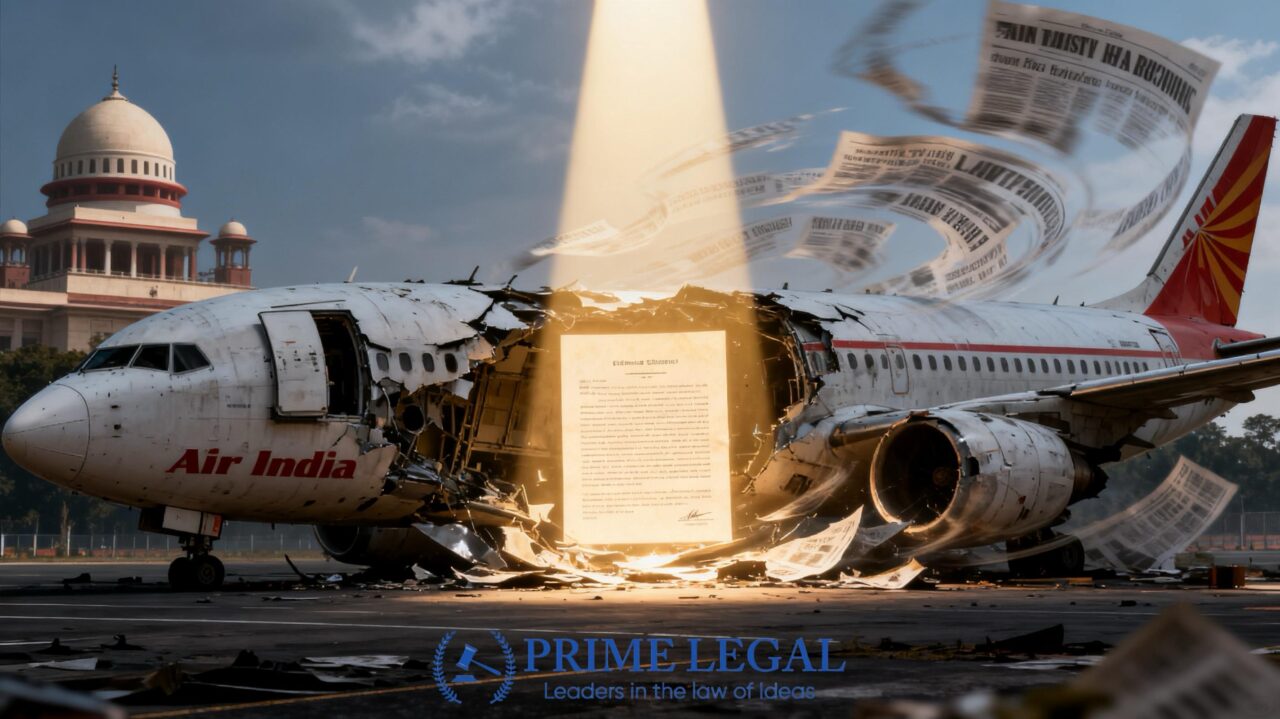Introduction
The Supreme Court of India took Suo Motu cognisance of the Air India tragedy on June 12, 2025, at the Ahmedabad Airport, which killed 260 individuals on the plane travelling from Dubai to Ahmedabad. After the culmination of pilot error was exclaimed and broadly publicised because of leaks of the preliminary investigation, the Court acted by issuing notice to perform a substantial and confidential inquiry about the tragic event. On the public’s disposition to assign blame prematurely, the Court, by Justices Surya Kant and N K Singh, was resolved that it ‘needed a thorough, transparent and objective investigation,’ on the basis that ‘it is entirely unacceptable when information entirely erodes credibility or impedes matters where public safety is paramount and is released or re-purposed prematurely.
Background
Calls for judicial review arose after the Aircraft Accident Investigation Bureau (AAIB) purportedly issued a preliminary report attributing liabilities to the officers, based on paraphrased recordings from the cockpit. The reports in the media, and information secured through leaks about preliminary media reporting described a pilot error incident, generating discomfort amongst the aviation fraternity and the general public about the integrity and transparency of the safety investigation process. A Public Interest Litigation (PIL) was filed by the NGO, Safety Matters Foundation, contending that the AAIB’s preliminary report did not comply with the Aircraft (Investigation of Accident and Incidents) Rules, 2017, since all factual information collected in the early stages of the investigation must be disseminated transparently. It also argued that withholding facts and releasing selective factual information creates ignorance amongst members of the public in order to demonstrate a biased public perception, and to delegitimize the investigative process.
Key Points
- Judicial Condemnation of Premature Attribution: The Supreme Court called the media speculation as “unfortunate” and “irresponsible” that was quick to assign blame to pilot error, citing the unfairness to the parties involved and the chance of misrepresenting the facts while an investigation was ongoing.
- Demand for Independence and Transparency: The bench issued notice to the Central Government, AAIB and Directorate General of Civil Aviation (DGCA) that required some response to the plea for an independent aviation investigation. The possibility of a conflict of interest was flagged, as the PIL alleged that DGCA employees were on the investigating panel – the same regulator whose actions or inactions might be the subject of scrutiny.
- Data Confidentiality and Procedural Fairness: The Court strenuously resisted arguments to immediately publish sensitive flight recorder data, stressing the need for confidentiality until all facts are established and warned against misuse and speculation about the events that could negatively affect each party in the inquiry and indeed aviation in general.
- Legal Standards for Accident Investigation: Rule 2(25) of the Aircraft (Investigation of Accidents and Incidents) Rules, 2017 state that preliminary reports must contain all factual information. The PIL stated that the AAIB report’s selective and decontextualised summarisation of cockpit conversation is inconsistent with these statutory requirements and undermines public confidence.
Recent Developments
On September 22, 2025, the Supreme Court issued a notice to the Central Government, DGCA, and ABIB stating that it was high time that an independent, transparent and speedy investigation was made into the crash of Air India. The court identified a premature and selective leak of the preliminary report naming pilot error as “unfortunate” and possibly prejudicial. Advocate Prashant Bhushan appearing on behalf of the Safety Matters Foundation argued that key technical data needed for the investigation was still being withheld including full cockpit voice recorder transcript, times matching both flight data and epaulettes switches to the cockpit, and electronic recordings of the aircraft faults. Bhushan also pointed to a conflict of interest where DGCA officers made a majority of the probe panel members. He requested that the court protect the independence of the investigation and demand full transparency and independence before any conclusion regarding cause is made.
Conclusion
The Supreme Court’s measured response emphasizes fundamental investigative principles of fairness, impartiality, and transparency in the context of aviation accidents. It condemned the wrongful premature blame of the pilots and called for an independent review, which has set the highest standard for the conduct of accident investigations in India. By expressly determining that only a complete and impartial examination of all technical and factual evidence can achieve justice, restore public confidence, and prevent egregious systemic failures in aviation, the judiciary has reinforced the existing statutory protections on essential confidentiality.
“PRIME LEGAL is a full-service law firm that has won a National Award and has more than 20 years of experience in an array of sectors and practice areas. Prime legal falls into the category of best law firm, best lawyer, best family lawyer, best divorce lawyer, best divorce law firm, best criminal lawyer, best criminal law firm, best consumer lawyer, best civil lawyer.”
WRITTEN BY Stuti Vineet


